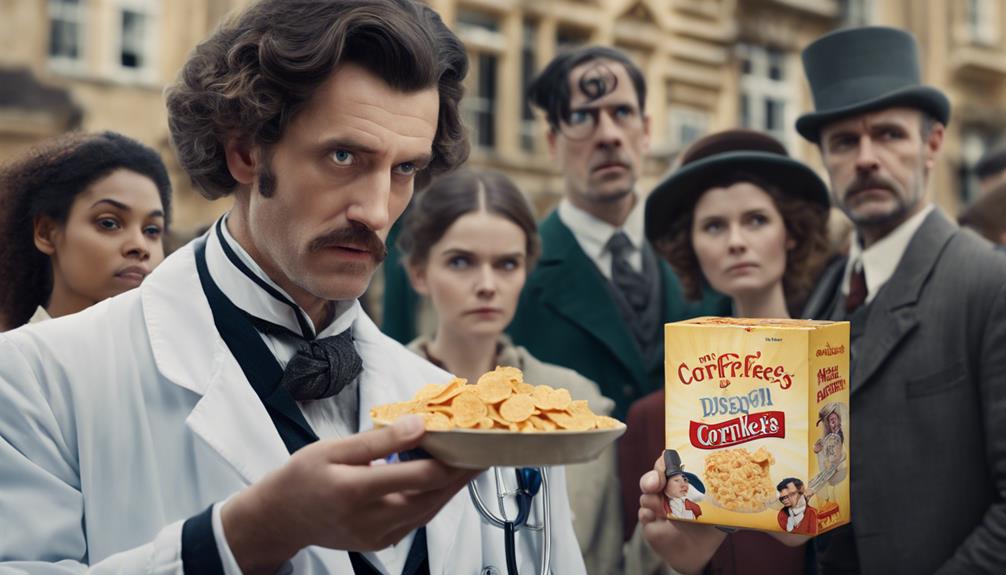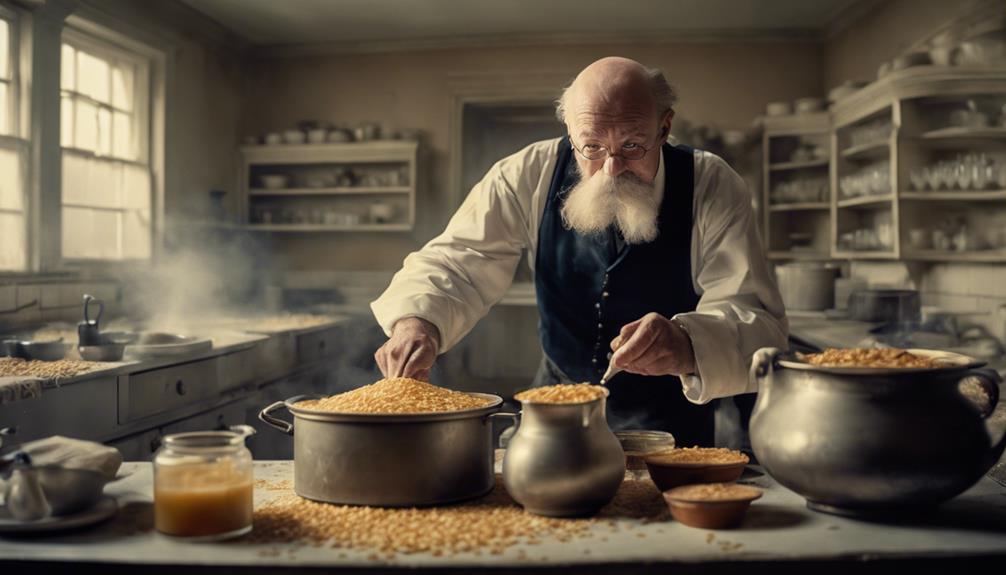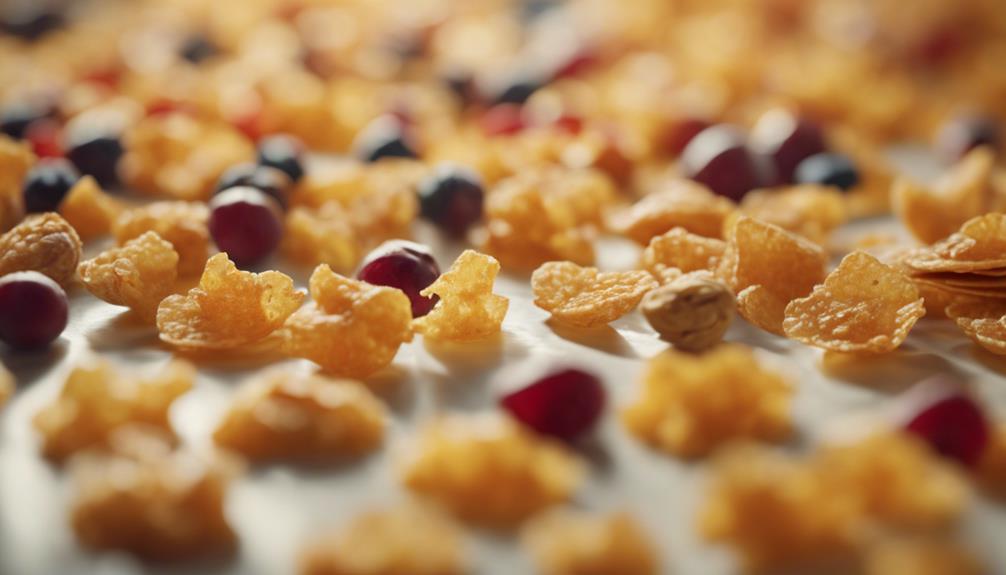Initially created as a bland food to suppress desires, Dr. John Harvey Kellogg invented cornflakes due to his strong anti-masturbation beliefs. This unconventional reason birthed a breakfast essential that reshaped global dietary patterns. Cornflakes, a product of Kellogg's Seventh-day Adventist convictions, evolved over time to become a widely embraced morning meal choice. Their impact on dietary habits and health-conscious routines is undeniable, paving the way for a broader understanding of food's influence on behavior and well-being. The bizarre origin story behind cornflakes reveals a deeper connection between breakfast choices and personal beliefs, shaping the way we approach our daily nutrition.
Key Takeaways
- Dr. John Harvey Kellogg invented cornflakes due to his Seventh-day Adventist beliefs and anti-masturbation stance.
- Cornflakes were initially a byproduct of fermented wheat-based cereal dough at Kellogg's sanitarium.
- The recipe evolved to corn-based flakes for better taste and nutrition.
- Kellogg's company added sugar to make cornflakes more appealing.
- Cornflakes were created to promote health, purity, and temperance in alignment with Kellogg's beliefs.
The Seventh-day Adventist Influence
Dr. John Harvey Kellogg's creation of Corn Flakes was heavily influenced by his Seventh-day Adventist beliefs. As a prominent figure within the Seventh-day Adventist community, Kellogg was deeply committed to the church's teachings on health and diet. His religious beliefs shaped his approach to food, leading him to develop bland and unstimulating options like Corn Flakes.
Kellogg firmly believed that consuming plain, simple foods could help curb desires and promote chastity, aligning with the Seventh-day Adventist emphasis on temperance and self-control. The close link between Kellogg's religious convictions and the invention of Corn Flakes highlights the intricate relationship between health, religion, and dietary practices.
Kellogg's Anti-Masturbation Beliefs

Kellogg's promotion of anti-masturbation beliefs influenced the creation of Corn Flakes as part of a strict diet regimen. Dr. Kellogg, driven by his extreme views on masturbation, designed Corn Flakes to be a key element in his pursuit of suppressing passion.
Here are some key points about Kellogg's anti-masturbation morning approach:
- Strict Diet Regimen: Kellogg recommended bland foods like Corn Flakes to deter indulgence and tame desires.
- Sugar-Free Recipe: The initial Corn Flakes recipe lacked sugar, aiming to discourage pleasure from eating.
- Negative Effects: Kellogg's anti-masturbation beliefs linked masturbation to various negative outcomes like mood swings and bad posture.
- Broader Mission: While Corn Flakes gained popularity, they were just one facet of Kellogg's broader mission to advocate for purity and health through dietary control.
Through his unconventional beliefs and dietary practices, Kellogg left a lasting impact on the creation and promotion of Corn Flakes.
The Origins of Cornflakes

The accidental creation of Corn Flakes stemmed from a fermented wheat-based cereal dough, which later evolved into the crispier corn-based flakes that are familiar today. Dr. John Harvey Kellogg, a health enthusiast and the inventor of Corn Flakes, was experimenting with various grain-based foods at his health resort in the late 19th century. Kellogg believed in the health benefits of a plant-based diet and wanted to create a wholesome, nutritious breakfast option for his patients.
He eventually replaced the wheat dough with cornmeal, leading to the creation of the first Corn Flakes. Contrary to Kellogg's original intentions of promoting health, the addition of sugar to the recipe later on aimed to enhance the taste and appeal of the cereal. These corn-based flakes quickly gained popularity, becoming a staple breakfast item for many households around the world.
The origins of Corn Flakes highlight the intersection of health, innovation, and taste in the domain of breakfast cereals.
The Original Cornflakes Recipe

In 1894, John Harvey Kellogg developed the original recipe for Corn Flakes, aiming for a healthy and bland breakfast option. The creation of Kellogg's Corn Flakes marked the beginning of a health food trend that still resonates today.
Here are some key points about the original Corn Flakes recipe:
- No Sugar Added: The original Corn Flakes recipe didn't contain sugar, distinguishing it from the sweeter versions available today.
- Health Focus: Created by John Harvey Kellogg, Corn Flakes were originally designed as part of a strict diet aimed to suppress passion and promote overall health.
- Seventh-day Adventist Influence: Advocated by the Seventh-day Adventist church, Corn Flakes were initially served to patients in Kellogg's sanitarium as part of their health regimen.
- Grain Variety: While the original recipe included various grains, it was the simple corn flakes portion that gained popularity and became the cornerstone of the Kellogg's brand.
Evolution of Cornflakes Over Time

Over time, the evolution of cornflakes has seen changes in flavor profiles and nutritional content. Created by Dr. John Harvey Kellogg as a breakfast cereal to promote a bland diet, the original Corn Flakes recipe lacked sugar, reflecting Kellogg's belief in the negative effects of indulging in sinful behaviors like masturbation.
However, as time progressed, Kellogg's creation underwent significant transformations. The Kellogg's company, founded by Dr. Kellogg's brother, Will Keith Kellogg, introduced innovations to enhance the taste and nutritional value of cornflakes. They began adding sugar to the recipe, making the cereal more appealing to a wider audience.
These adjustments not only improved the flavor but also contributed to the popularity of Corn Flakes as a breakfast staple around the world. From its humble beginnings as a simple, bland cereal, cornflakes evolved into a beloved morning meal option enjoyed by many.
Cornflakes: A Breakfast Staple

For many, cornflakes have become a go-to breakfast choice due to their simplicity and satisfying crunch. The history of cornflakes showcases how a health-related invention by John Harvey Kellogg evolved into a beloved morning staple:
Convenience: Kellogg's Cornflakes quickly gained popularity for their ease of preparation. Simply pour them into a bowl, add milk, and breakfast is served.
Versatility: Cornflakes can be enjoyed in various ways, whether eaten plain, with fresh fruits, or even used in recipes like crispy chicken breading.
Nutritional Value: While the original recipe was simple, cornflakes are fortified with vitamins and minerals, making them a nutritious choice for breakfast.
Global Appeal: What started as a health food experiment in Kellogg's sanitarium has now become a worldwide breakfast favorite, enjoyed by people of all ages.
Cornflakes, with their humble beginnings and widespread acclaim, continue to hold a special place in breakfast routines around the globe.
Impact on Dietary Habits

Corn Flakes's invention had a profound impact on dietary habits, shifting the focus towards healthier, less indulgent eating choices.
The introduction of a bland, sugar-free cereal aimed to promote purity and temperance in consumption, aligning with Dr. Kellogg's Seventh-day Adventist beliefs.
As Corn Flakes gained popularity globally, they reshaped breakfast routines, encouraging a more subdued and health-conscious approach to the first meal of the day.
Diet Change Influence
The invention of Corn Flakes by Dr. John Harvey Kellogg had a significant impact on dietary habits, promoting a shift towards bland and healthier breakfast choices.
Kellogg introduced Corn Flakes at his health resort as part of his Seventh-day Adventist beliefs in biologic living. He believed that plain foods like Corn Flakes could help suppress passions, particularly the urge for masturbation.
By offering a cereal that was less palatable and devoid of sugar, Kellogg aimed to reform morning eating habits to discourage indulgence. The introduction of Corn Flakes marked a departure from the rich, heavy breakfasts commonly consumed, encouraging a more subdued and chaste lifestyle.
Kellogg's unconventional approach to diet and lifestyle through the creation of Corn Flakes not only influenced breakfast choices but also sparked a broader conversation about the impact of food on behavior and well-being.
Eating Habits Shift
Kellogg's advocacy for bland and healthful foods, exemplified through the creation of Corn Flakes, played a pivotal role in reshaping Americans' dietary habits towards a more wholesome and balanced approach. Kellogg saw the importance of shifting from heavy, meat-centric diets to a more plant-based, vegetarian diet to address health concerns prevalent in the 19th century.
By introducing Corn Flakes as a part of an anti-masturbatory morning routine, Kellogg aimed to promote a healthier lifestyle rooted in biologic living principles.
The change in eating habits sparked by Kellogg's vision marked a significant turning point in American dietary culture. Through his emphasis on whole grains and less meat consumption, Kellogg laid the foundation for a broader movement towards healthier eating habits that prioritized simplicity and nutrition.
The enduring legacy of Corn Flakes reflects Kellogg's commitment to promoting plain, healthful foods as a means of combating societal ills and fostering overall well-being. This enduring impact continues to influence modern health trends and dietary preferences, highlighting the lasting significance of Kellogg's innovative approach to food and health.
Legacy of Cornflakes

The legacy of Cornflakes is multifaceted, encompassing health benefits, innovative marketing strategies, and a profound cultural impact.
From their inception as a simple, unsweetened cereal meant to promote health and purity, Cornflakes have evolved into a beloved breakfast choice worldwide.
The influence of Cornflakes extends beyond mere nutrition, shaping the way we perceive breakfast foods and the power of advertising in the modern era.
Cornflakes' Health Benefits
Cornflakes' introduction to the market marked a significant shift towards promoting health-conscious breakfast choices. Here are some health benefits associated with cornflakes:
- Nutrient-rich: Cornflakes are fortified with essential vitamins and minerals like iron, vitamin D, and B vitamins, contributing to a balanced diet.
- Low in calories: With a relatively low calorie count per serving, cornflakes can be a suitable option for individuals aiming to manage their weight.
- Source of fiber: Cornflakes contain dietary fiber, promoting digestive health and helping individuals feel full for longer periods.
- Convenient and versatile: Cornflakes can be consumed with milk, yogurt, or fruit, offering a quick and easy breakfast option for busy mornings.
Despite their simple ingredients, cornflakes provide a convenient and nutritious breakfast choice for many consumers. The legacy of the Kellogg Company's initial health-focused approach continues to influence breakfast options today.
Marketing Strategies Used
With a focus on appealing to a broad consumer base, the marketing strategies employed for cornflakes revolutionized the breakfast industry. Kellogg's views on marketing were innovative, leading to the rise of this popular cereal. They understood the importance of branding and targeted various demographics, including children, with colorful packaging and mascots. This approach not only boosted sales but also played a significant role in the growth of the advertising industry. By utilizing endorsements and catchy slogans, Kellogg's and Post's iconic cereals captured the attention of consumers of all ages, solidifying their places in households worldwide. The success of cereals like Corn Flakes set a precedent for modern food marketing techniques and the concept of branded products. Their legacy in marketing history underscores the enduring impact of advertising on consumer preferences and breakfast choices.
| Marketing Strategies | Impact on Industry | Target Demographics |
|---|---|---|
| Branding | Growth of Advertising | Children |
| Endorsements | Rise of Branded Products | All Ages |
| Catchy Slogans | Influence on Consumer Preferences | Broad Consumer Base |
Cultural Impact of Cornflakes
Dr. John Harvey Kellogg's creation of Corn Flakes in 1894 at his health sanitarium had a profound cultural impact, transcending its original purpose as a bland health food.
Breakfast Staple: Corn Flakes revolutionized the breakfast table, introducing a convenient and quick meal option that appealed to a wide audience beyond the health-conscious.
Marketing Evolution: The success of Corn Flakes paved the way for the marketing of other cereals, shaping the modern food industry's approach to advertising and packaging.
Global Influence: Corn Flakes' popularity spread internationally, becoming a symbol of Western dietary habits and influencing breakfast choices worldwide.
Health Food Perception: Despite its humble beginnings as a simple health food, Corn Flakes' cultural impact transformed perceptions of cereals, emphasizing convenience and taste alongside nutritional value.
Corn Flakes' journey from a bland health food designed for specific dietary restrictions to a beloved mainstream cereal reflects the evolving tastes and preferences of consumers over time.
Frequently Asked Questions
What Was the Original Purpose of Corn Flakes?
The original purpose of Corn Flakes was to provide a bland, healthy breakfast choice to suppress passions and discourage indulgence. Dr. John Harvey Kellogg invented them in 1894 as part of a strict diet regimen.
Was Kellogg's Corn Flakes Invented to Lower Testosterone?
While not directly aimed at lowering testosterone, Kellogg's Corn Flakes were part of his push for purity and abstinence. Dr. Kellogg believed bland foods could curb sexual desires, aligning with his anti-masturbation beliefs.
Did Kellogg Promote Circumcision?
Yes, Kellogg did promote circumcision as a means to deter sexual urges. He also recommended painful devices for young boys to prevent erections and advised using carbolic acid on young girls to discourage masturbation, part of his unconventional medical practices.
What Is the Oldest Cereal?
Grains of time, ancient bowls filled with wisdom, hold the oldest cereal known as porridge, cherished by civilizations of yore. Its origins trace back to barley, wheat, and oats, nurturing bodies and souls.
Conclusion
To sum up, the invention of cornflakes may have been rooted in some unusual beliefs, but today they've become a staple breakfast item enjoyed by many.
While some may question the unorthodox origins of this popular cereal, it's important to remember that the evolution of cornflakes over time has transformed them into a widely accepted and beloved food choice.
So next time you pour yourself a bowl of cornflakes, remember the fascinating history behind this morning favorite.










